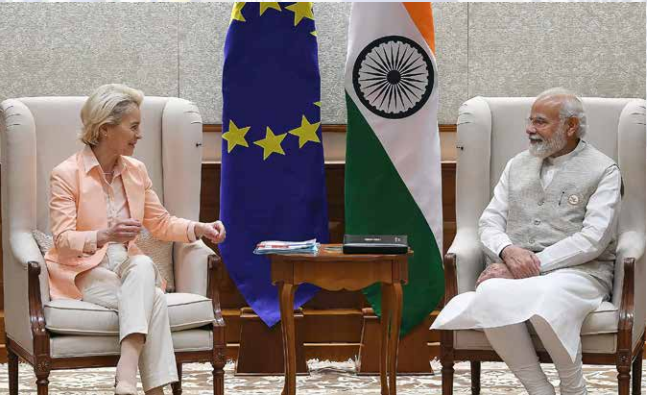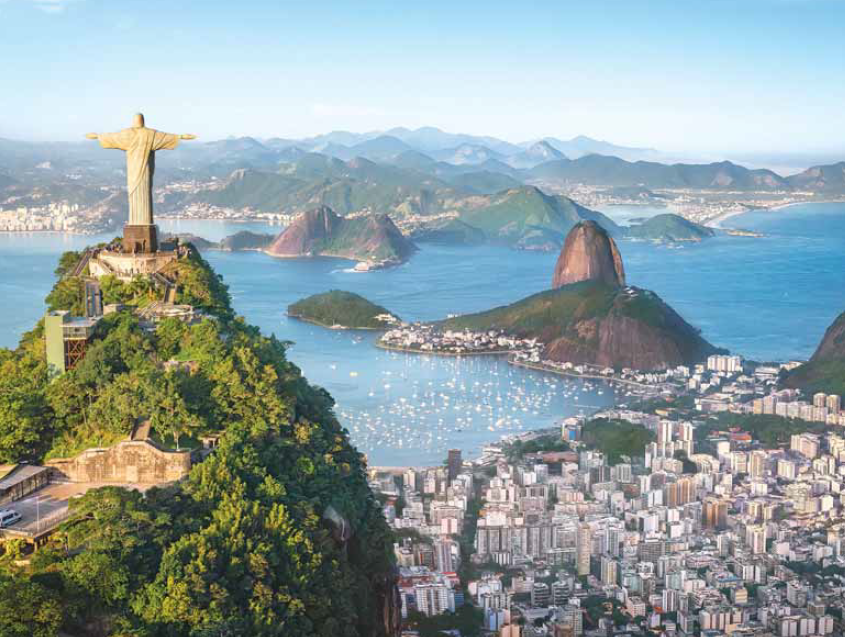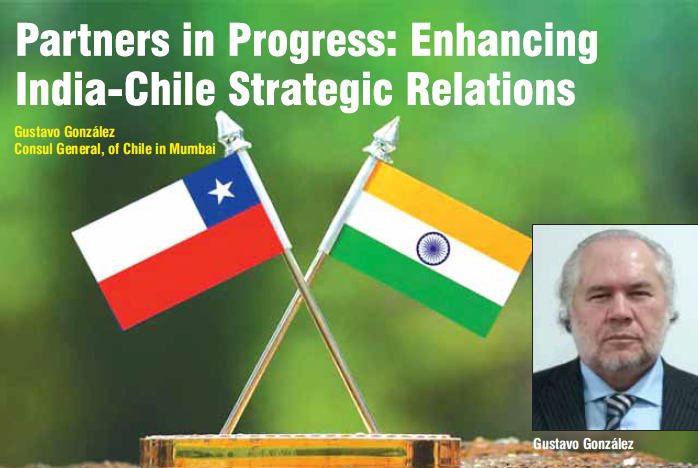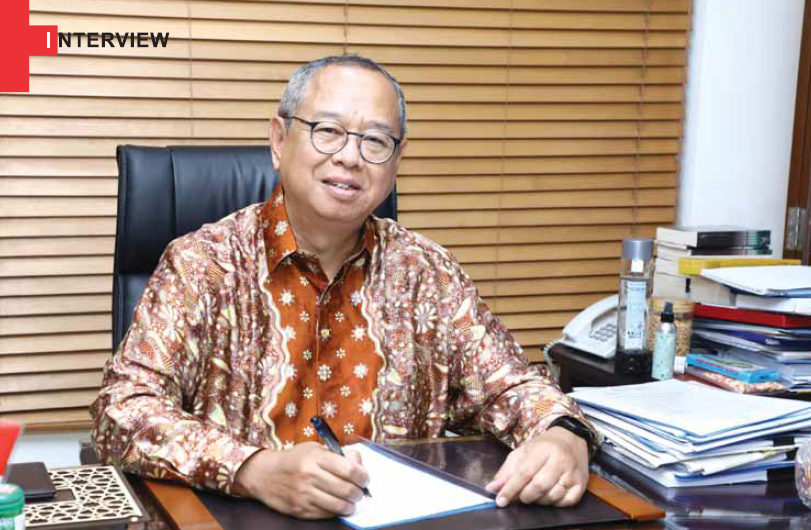In a significant diplomatic engagement, the Prime Minister of India recently hosted European Commission President Ursula von der Leyen, along with the EU College of Commissioners, marking a crucial moment in India-EU relations. This historic visit, the inaugural instance of the College of Commissioners convening outside Europe at the commencement of a new EU mandate, underscores the shared commitment to augmenting strategic cooperation across diverse sectors.

Prime Minister Shri Narendra Modi and President Ursula von der Leyen asserted that the EU-India Strategic Partnership has generated substantial benefits for their respective populations and the broader global community. They pledged to elevate this partnership, building on two decades of the India-EU Strategic Partnership and over thirty years of cooperation under the India-EC Cooperation Agreement.
President von der Leyen’s official visit on 27-28 February 2025 is particularly noteworthy as it represents the first occasion that the College of Commissioners has convened outside the European continent since their new mandate began, as well as the first such engagement in the annals of India-EU bilateral relations.
As two of the largest democracies and open market economies with diverse pluralistic societies, India and the EU reaffirmed their collective commitment to fostering a resilient multipolar global order that underpins peace, stability, economic growth, and sustainable development.
A Partnership for a Transforming World
In light of the rapid transformations characterising the global landscape—driven by advancements in artificial intelligence, emerging technologies, and fluctuating geopolitical and economic dynamics—the partnership between India and the EU assumes heightened importance. Both entities, unified by democratic values and a commitment to a rules-based international order, continue to bolster their collaboration to address global challenges while unlocking new economic and technological possibilities.
Reflecting on the two-decade-long strategic partnership, the Prime Minister commended the high-level ministerial engagements that occurred during the visit, which included approximately twenty bilateral meetings and a productive session of the India-EU Trade and Technology Council (TTC). These discussions have laid a robust foundation for deeper collaboration across multiple domains.
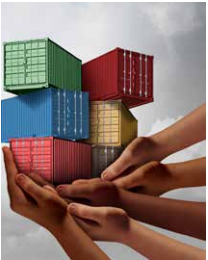
Key Areas of Cooperation
The leaders underscored that shared values and principles—such as democracy, the rule of law, and adherence to a rules-based international order aligned with the purposes and principles of the UN Charter—position India and the EU as like-minded and trusted partners. The India-EU Strategic Partnership is deemed essential now more than ever to collaboratively address global issues, foster stability, and promote mutual prosperity.
In this context, the leaders delineated eight strategic priorities that will shape the next phase of India-EU cooperation:
Supply Chain Resilience
The India-EU Trade and Technology Council will be directed to enhance its engagement to foster outcome-oriented cooperation in areas pertaining to economic security and supply chain resilience. This includes market access and trade barriers, augmentation of semiconductor ecosystems, sustainable artificial intelligence, high-performance computing, 6G technology, digital public infrastructure, and collaborative research and innovation targeting green and clean energy technologies. Emphasis will also be placed on trustworthy partnerships and industry linkages across these sectors, particularly regarding the recycling of batteries for electric vehicles, addressing marine plastic litter, and converting waste to green or renewable hydrogen. In this regard, progress in the implementation of the Memorandum of Understanding on semiconductors for strengthening supply chains has been welcomed, which includes leveraging complementary strengths and facilitating talent exchanges to enhance semiconductor skills among students and young professionals. Additionally, the signing of the Memorandum of Understanding between the Bharat 6G alliance and the EU 6G Smart Networks and Services Industry Association aims to create secure and trusted telecommunications while fostering resilient supply chains.

Strategic Technologies, Digital Governance, and Digital
Connectivity
India and the European Union (EU) have reaffirmed their commitment to enhancing digital cooperation through the establishment of the Working Group on Strategic Technologies. Both parties aim to facilitate a human-centric digital transformation by advancing key areas such as artificial intelligence (AI), semiconductors, high-performance computing, and 6G technology, thereby ensuring economic security and competitiveness.
The parties have agreed to improve the interoperability of Digital Public Infrastructure (DPI) while prioritising the protection of human rights, privacy, and intellectual property. The mutual recognition of electronic signatures is expected to streamline cross-border digital transactions.
To fortify semiconductor supply chains, India and the EU will collaborate on research and development (R&D) in chip design, sustainable technologies, and advanced manufacturing processes. Additionally, the launch of talent exchange programmes will further enhance this collaboration.
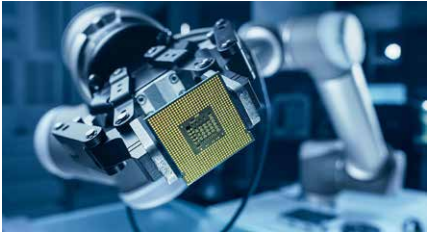
In terms of AI, both sides are committed to its safe, responsible, and trustworthy development, with plans to expand cooperation between the European AI Office and the India AI Mission. Joint initiatives will focus on ethical AI, large language models, and their applications in climate science and bioinformatics.
A newly established 6G partnership between the Bharat 6G Alliance and the EU’s 6G Smart Networks Association will align research and development priorities and bolster telecommunications security. Further cooperation will encompass standardisation in information technology and telecommunications, the development of digital skills, and the establishment of legal frameworks for skilled professionals.
Both parties have also pledged to collaborate on the implementation of the Global Digital Compact and advance multi-stakeholder internet governance, particularly through WSIS+20.
Clean and Green Technologies
India and the EU have reiterated their commitment to achieving net-zero emissions, with India targeting 2070 and the EU aiming for 2050, through technological innovation, investment, and market collaboration. To propel advancements in clean technologies, they intend to strengthen R&D partnerships, support startups and small to medium-sized enterprises (SMEs), and promote the market adoption of innovative solutions.
A joint research fund amounting to EUR 60 million has been established for critical sustainability initiatives, including battery recycling for electric vehicles, the detection of marine plastic litter, and waste-to-hydrogen technologies. Expert exchanges will address EV interoperability, charging infrastructure, and standardisation. Moreover, an Ideathon will facilitate collaborative problem-solving regarding marine plastic pollution, while both sides will explore harmonised hydrogen safety standards and advances in wastewater treatment technologies.
Trade, Investment, and Resilient Value Chains
India and the EU are committed to fostering resilient, diversified, and sustainable value chains, complementing ongoing negotiations regarding the Free Trade Agreement (FTA) and the Investment Protection Agreement (IPA). Their collaboration will span several key sectors:
1. Agriculture – Focus on strengthening climate-resilient farming practices, crop diversification, and strategies for food security.
2. Pharmaceuticals – Aim to enhance transparency and sustainability in the supply chains of Active Pharmaceutical Ingredients (APIs).
3. Clean Technologies – Work towards expanding supply chains for solar energy, offshore wind energy, and hydrogen while minimising trade barriers and encouraging investment.
Both parties will continue to address market access issues and enhance cooperation regarding Foreign Direct Investment (FDI) screening. They have reaffirmed their support for reforms within the World Trade Organisation (WTO) and a functional dispute resolution system, alongside ongoing discussions regarding the EU’s Carbon Border Mechanism (CBAM) to address challenges facing SMEs.
Reiterating their commitment to strengthen economic and technological cooperation, India and the EU plan to reconvene within a year for the next Trade and Technology Council (TTC) meeting to evaluate progress and establish new priorities.
Connectivity and Climate Action
Concrete steps will be undertaken to realise the India-Middle East-Europe Economic Corridor (IMEC), as announced during the G20 Leaders’ Summit in New Delhi. Additionally, both parties will further deepen their cooperation within the framework of the International Solar Alliance (ISA), the Coalition for Disaster Resilient Infrastructure (CDRI), the Leadership Group for Industry Transition (LeadIT 2.0), and the Global Biofuels Alliance.
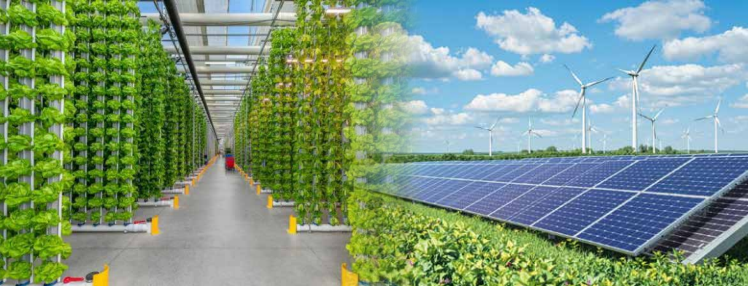
Furthermore, India and the EU will continue to expand and deepen collaboration in connectivity, clean energy, climate, water management, smart and sustainable urbanization, and disaster management. Specific areas of intensified cooperation will include clean hydrogen, offshore wind energy, solar energy, sustainable urban mobility, aviation, and rail systems. In this context, both parties have welcomed the agreement to hold an India-EU Green Hydrogen Forum and the India-EU Business Summit on Offshore Wind Energy.
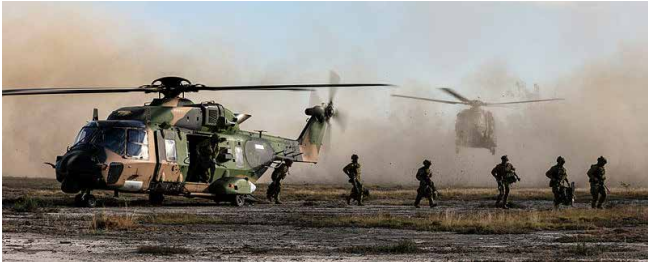
Defence Cooperation
The leaders have expressed satisfaction with the growth of cooperation within the defence and security sectors, which includes joint exercises and collaboration between the Indian Navy and EU maritime security entities. The EU has welcomed India’s interest in participating in projects under the EU’s Permanent Structured Cooperation (PESCO) and engaging in negotiations for a Security of Information Agreement (SoIA). The leaders also reaffirmed their commitment to exploring a security and defence partnership.
People-to-People Ties
India and the European Union (EU) are committed to enhancing their people-to-people ties across various sectors including education, research, culture, sports, tourism, and youth exchanges. This collaboration aims to foster mutual understanding, create economic opportunities, and promote shared growth, reflecting a longstanding commitment to a more interconnected future.
India continues to be a primary beneficiary of the EU’s Erasmus+ program, with over 6,000 scholarships awarded. Additionally, more than 2,700 Indian researchers have participated in the Marie Skłodowska-Curie Actions, representing the highest participation rate globally. The inauguration of India’s first Jean Monnet Centre of Excellence at Manipal Academy further strengthens academic cooperation. In recognition of India’s skilled workforce and the labour market needs within the EU, both parties have initiated Phase II of the India-EU Migration and Mobility project. This project seeks to facilitate legal migration and mitigate irregular movement, with Indian professionals now acquiring over 20% of EU Blue Cards. Efforts to streamline Schengen visa processes and enhance air connectivity, as established under the 2008 Horizontal Civil Aviation Agreement, are expected to boost business, tourism, and academic exchanges. Furthermore, expanded cultural, sports, and youth collaborations will enhance cross-cultural understanding and fortify long-term ties. Through these initiatives, India and the EU are establishing a foundation for a more interconnected and mutually beneficial partnership.
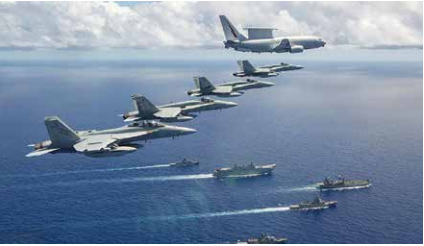
During recent discussions, the leaders addressed key international and regional issues, including the Middle East and the war in Ukraine. They reaffirmed their dedication to achieving a just and lasting peace in Ukraine, grounded in adherence to international law, the UN Charter, as well as the principles of territorial integrity and sovereignty. Regarding the Israel-Palestine conflict, both parties reiterated their steadfast support for a two-state solution, envisioning peaceful coexistence within recognised borders in accordance with international law.
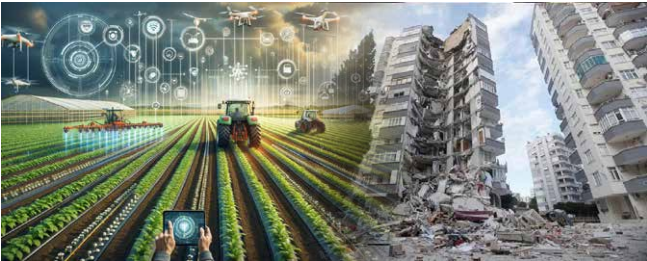
Acknowledging the depth and productivity of their dialogue, the leaders agreed upon a series of concrete steps to advance bilateral cooperation. They committed to expediting the conclusion of the Free Trade Agreement (FTA) by the conclusion of the year and to intensifying discussions regarding defense industry collaboration and related policy initiatives. A review meeting with stakeholders will evaluate progress concerning the India-Middle East-Europe Economic Corridor (IMEC), while efforts to enhance maritime domain awareness will improve shared assessments, coordination, and interoperability.
To foster technological and economic collaboration, both parties agreed to convene the next Trade and Technology Council (TTC) meeting at the earliest opportunity to deepen cooperation in semiconductors and other critical technologies. They also pledged to enhance dialogue among governments and industries concerning clean and green energy, with a particular focus on green hydrogen. In the Indo-Pacific region, cooperation will be expanded through trilateral initiatives, reinforcing shared strategic priorities. Additionally, efforts to strengthen disaster management coordination will be advanced through both policy and technical engagements, improving preparedness, response capabilities, and overall resilience.
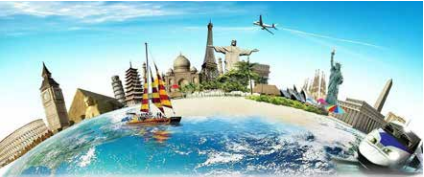
A Vision for the Future
As preparations for the forthcoming India-EU Summit are underway, both parties reiterated their commitment to ambitious actions and a shared vision for a resilient global order. President von der Leyen acknowledged India’s increasing role in shaping international developments, while the Prime Minister emphasissed the importance of speed and strategic foresight in an era characterized by rapid technological advancements. The session concluded with a mutual optimism for the future, with both leaders agreeing to organize the next India-EU Summit at the earliest opportunity, during which a new joint Strategic Agenda will be adopted. This high-level engagement represents a significant moment in India-EU relations, setting the stage for deeper cooperation and sustainable global progress in the years to come.


